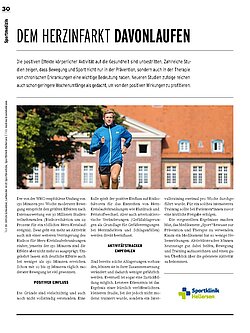WIR IM SPORT 05.2023
Magazine of the Landessportbund NRW
PDF-Download
The positive effects of physical activity on health are undisputed. Numerous studies show that exercise and sport play an important role not only in the prevention but also in the treatment of chronic diseases. According to recent studies, even a smaller amount of exercise per week than expected is enough to benefit from the positive effects.
The 150 minutes of moderate exercise per week recommended by the WHO corresponds to the greatest effects according to data analysis of 30 million study participants (risk reduction of 29% for a fatal cardiovascular event). Although more activity is also associated with a further reduction in the risk of cardiovascular disease, the effects are no longer as pronounced after 150 minutes. Conversely, significant effects can also be achieved with less than 150 minutes. Just 10 to 15 minutes of moderate exercise a day goes a long way.
Positive influence
The reasons for this are complex and not yet fully understood. The positive influence on risk factors for the development of cardiovascular diseases such as blood pressure and lipid metabolism plays a role. However, arteriosclerotic changes (vascular deposits as the basis for vasoconstriction in heart attacks and strokes) are also directly influenced.
Activity tracker recommended
If such deposits are already present, their composition can be changed, making them less dangerous. It may even be possible to reduce them. The latter finding is the result of a recently published small study, which did not involve moderate training, but rather interval training twice a week. Patients should first obtain medical clearance for such more intensive training. The results presented encourage the conscious use of the drug "sport" for prevention and therapy. Hardly any other medication has so few side effects. Nowadays, activity trackers can help to record exercise and training and provide a good overview of the activity performed.



